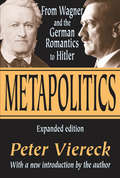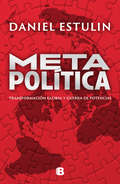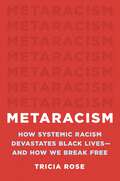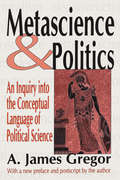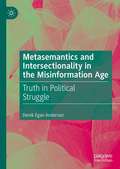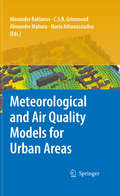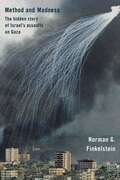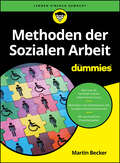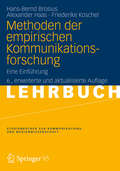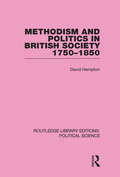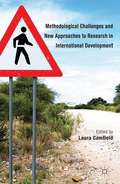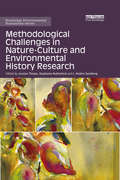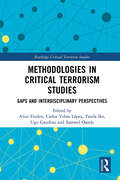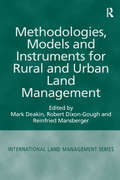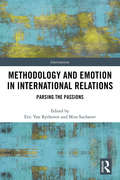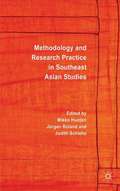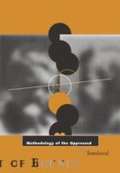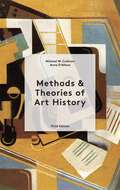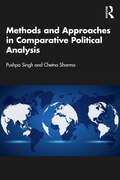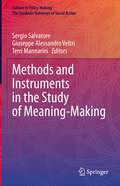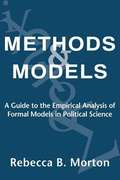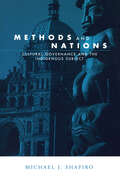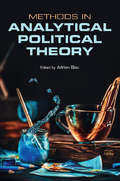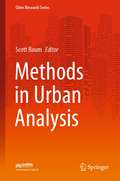- Table View
- List View
Metapolitics: From Wagner and the German Romantics to Hitler
by Peter ViereckMore than half a century after the fall of the Third Reich, Nazism, its roots and its essential nature, remain a central and unresolved enigma of the twentieth century. During the period of Hitler's ascendancy, most attempts at explaining this unprecedented phenomenon were framed in "economic," often Marxist, sociological terms and concepts. Peter Viereck's Metapolitics, initially published in 1941, broke with this convention by indicting Hitler in terms of the Judaic-Christian ethical tradition and locating certain elements of the Nazi worldview in German romantic poetry, music, and social thought. Newly expanded, Metapolitics remains a key work in the cultural interpretation of Nazism and totalitarianism and in the psychological interpretation of Hitler as a Wagnerite and failed artist.The term "metapolitics," a coinage from Richard Wagner's nationalist circle, signifies an ideology resulting from five distinct strands: romanticism (embodied chiefly in the Wagnerian ethos), the pseudo-science of race, Fuehrer worship, vague economic socialism, and the alleged supernatural and unconscious force of the Volk collectivity. Together, those elements engendered an emphasis on irrationalism and hysteria and belief in a special German mission to direct the course of the world's history.Viereck analyzes nineteenth-century German thought's conflicting attitudes toward political procedures and social arrangements rooted in classical, rational, legalistic, and Christian traditions. This edition includes an appreciation by Thomas Mann and an exchange with Jacques Barzun debating Viereck's criticism of German romanticism. Viereck's essays on the case of Albert Speer, on Claus von Stauffenberg (the German officer who led the army conspiracy to assassinate Hitler), and on the poets Stefan George and Georg Heym appear here for the first time in book form.
Metapolítica
by Daniel EstulinTransformación global y guerra de potencias No es ningún secreto que la civilización actual atraviesa por una crisis de proporciones inimaginables, y que en términos geopolíticos y económicos ya nada será lo que fue. La pandemia del coronavirus solo ha venido a acelerar este proceso que se desarrolló tras bambalinas desde hace años. ¿Pero hacia dónde se dirige el mundo? Daniel Estulin, a través de esta excelente investigación, nos muestra lo que las élites globales han conspirado y planeado desde las sombras para imponer el nuevo orden mundial. Los enfrentamientos son inevitables y cada uno de estos jugadores pretende mejorar su posición. ¿Qué resultará del enfrentamiento entre Estados Unidos y China? ¿Qué planes tienen el mundo islámico y Rusia para volver a ser jugadores preponderantes? ¿Acaso las nuevas élites alternativas buscan romper con la hegemonía de la Internacional Financiera? ¿Qué escenarios le esperan a América Latina? Cualquiera que desee entender las profundas implicaciones de los tiempos que atravesamos debe, con urgencia, leer este libro para tomar cierta ventaja del terremoto geopolítico que está por venir.
Metaracism: How Systemic Racism Devastates Black Lives—and How We Break Free
by Tricia RoseThe definitive book on how systemic racism in America really works, revealing the vast and often hidden network of interconnected policies, practices, and beliefs that combine to devastate Black lives In recent years, condemnations of racism in America have echoed from the streets to corporate boardrooms. At the same time, politicians and commentators fiercely debate racism&’s very existence. And so, our conversations about racial inequalities remain muddled. In Metaracism, pioneering scholar Tricia Rose cuts through the noise with a bracing and invaluable new account of what systemic racism actually is, how it works, and how we can fight back. She reveals how—from housing to education to criminal justice—an array of policies and practices connect and interact to produce an even more devastating &“metaracism&” far worse than the sum of its parts. While these systemic connections can be difficult to see—and are often portrayed as &“color-blind&”—again and again they function to disproportionately contain, exploit, and punish Black people. By helping us to comprehend systemic racism&’s inner workings and destructive impacts, Metaracism shows us also how to break free—and how to create a more just America for us all.
Metascience and Politics: An Inquiry into the Conceptual Language of Political Science
by A. James GregorA central problem in political inquiry is the conceptual and linguistic informality of political science. For most of its history, the discipline has been largely pursued with the analytic and logical machinery of ordinary language. Likewise, there has been little effort to standardize how language is used, or to systematize theoretical procedures to insure methodological uniformity. In an effort to better understand and defend the research processes that attend, sustain, and foster the systematic credibility of political science, Gregor argues a special conceptual language is needed to enhance the rigor, replicability, articulation, and interpretation of political science's empirical findings.Gregor reviews the conceptual inventory of the social sciences in general with particular emphasis on distinctions between descriptive, theoretical, and normative language. He analyzes what might count as "objectivity" and "truth" in a given set of circumstances in an effort to standardize how political scientists make such distinctions. How "theory" and "explanation" might be assessed in less rigorous disciplines is also considered. Gregor is opposed to the postmodernist tendency to use "language games" in the social sciences that purport to close the gaps separating the discourses of knowledge, ethics and politics, but do so at the expense of clarity, rigor, and objectivity. In Gregor's view, these alternative perspectives have exploited vagueness and ambiguity in order to accomplish what they consider to be their political tasks. A substantial postscript to this edition traces some of the postmodernist perspectives to their origins in the works of particular individuals and to their history in the thought of twentieth-century Europe.Metascience and Politics attempts to address all these issues, with brevity and seriousness of purpose, in order to provide a defensible rationale for the scientific character of social and political studies. It will be of interest to political scientists, sociologists, philosophers, and intellectual historians.A. James Gregor is professor of political science at the University of California at Berkeley and an adjunct professor at Command and Staff College, U.S. Marine Corps University at Quantico, Virginia. He has also been awarded the Order of Merit by the President of the Italian Republic for his contribution to Italy as a nation through his published works. He is the author of Giovanni Gentile: Philosopher of Fascism, Interpretations of Fascism, Phoenix: Fascism in Our Time, and Marxism, China, and Development, all published by Transaction.
Metasemantics and Intersectionality in the Misinformation Age: Truth in Political Struggle
by Derek Egan AndersonThis book investigates the impact of misinformation and the role of truth in political struggle. It develops a theory of objective truth for political controversy over topics such as racism and gender, based on the insights of intersectionality, the Black feminist theory of interlocking systems of oppression. Truth is defined using the tools of model theory and formal semantics, but the theory also captures how social power dynamics strongly influence the operation of the concept of truth within the social fabric. Systemic ignorance, propagated through false speech and misinformation, sustains oppressive power structures and perpetuates systemic inequity. Truth tends to empower marginalized groups precisely because oppressive systems are maintained through systemic ignorance. If the truth sets people free, then power will work to obscure it. Hence, the rise of misinformation as a political weapon is a strategy of dominant power to undermine the political advancement of marginalized groups.
Meteorological and Air Quality Models for Urban Areas
by Alexander Baklanov Maria Athanassiadou Sue Grimmond Alexander MahuraThis book for the first time gives an overall view of the current situation in urbanization of meteorological and air quality models around the world. It discusses and makes recommendations on the best practice and strategy for urbanization of different types of meteorological and air quality models. Based on the selected presentations given at the COST728 workshop, the contributions are arranged in four parts: urban morphology and databases; parameterizations of urban canopy; strategy for urbanization of different types of models; and evaluation and city case studies / field studies. The chapters treat either dynamic (on wind and turbulent) and thermal effects (on temperature and energy in general). The final chapter of this volume summarizes the discussion and conclusions from the four main topics and provides recommendations and future requirements. This monograph is oriented towards numerical weather prediction and air quality modelling communities.
Method And Madness: The Hidden Story of Israel's Assaults on Gaza
by Norman G. FinkelsteinIn the past five years Israel has mounted three major assaults on the 1.8 million Palestinians trapped behind its blockade of the Gaza Strip. Taken together, Operation Cast Lead (2008-9), Operation Pillar of Defense (2012), and Operation Protective Edge (2014), have resulted in the deaths of some 3,700 Palestinians. Meanwhile, a total of 90 Israelis were killed in the invasions. On the face of it, this succession of vastly disproportionate attacks has often seemed frenzied and pathological. Senior Israeli politicians have not discouraged such perceptions, indeed they have actively encouraged them. After the 2008-9 assault Israel's then-foreign'minister, Tzipi Livni, boasted, "Israel demonstrated real hooliganism during the course of the recent operation, which I demanded." However, as Norman G. Finkelstein sets out in this concise, paradigm-shifting new book, a closer examination of Israel's motives reveals a state whose repeated recourse to savage war is far from irrational. Rather, Israel's attacks have been designed to sabotage the possibility of a compromise peace with the Palestinians, even on terms that are favorable to it.
Methoden der Sozialen Arbeit für Dummies (Für Dummies)
by Martin BeckerDas Handwerkszeug für Fachkräfte Sozialer Arbeit Soziale Arbeit ist mehr als nur Hilfe zur Selbsthilfe – sie ist eine komplexe Wissenschaft, die Theorie und Praxis miteinander verbindet. In diesem Buch erfahren Sie, wie Sie die Methoden der Sozialen Arbeit in der Praxis effektiv anwenden können. Wie finden Sie die Interessen der Menschen in einem Stadtteil heraus? Wie gewinnen Sie das Vertrauen Ihrer Klienten und bewahren gleichzeitig den nötigen Abstand? Mit zahlreichen Beispielen aus dem Arbeitsalltag ist dieses Buch ein wertvoller Begleiter für alle, die sich für die Methoden Sozialer Arbeit interessieren. Sie erfahren Welchen Auftrag Fachkräfte Sozialer Arbeit haben Wie vielfältig die Methoden Sozialer Arbeit sind Wie Sie die passenden Methoden effektiv einsetzen Wie wirksam Soziale Arbeit sein kann
Methoden der empirischen Kommunikationsforschung
by Friederike Koschel Alexander Haas Hans-Bernd BrosiusDieses Buch ist eine Einführung in die wesentlichen Methoden der empirischen Kommunikationswissenschaft. Es wendet sich insbesondere an Studierende der Kommunikations- und Medienwissenschaft, die erste Erfahrung mit empirischen Methoden sammeln, und eignet sich als vertiefende Begleitung einführender Vorlesungen und als praxisorientierte Handreichung für Methodenübungen. Leichte Verständlichkeit, Anwendungsorientierung und eine klare Gliederung sind die Haupteigenschaften dieses Lehrbuchs.
Methodism and Politics in British Society 1750-1850 (Routledge Library Editions: Political Science #31)
by David HemptonOriginally published in 1984, this book charts the political and social consequences of Methodist expansion in the first century of its existence. While the relationship between Methodism and politics is the central subject of the book a number of other important themes are also developed. The Methodist revival is placed in the context of European pietism, enlightenment thought forms, 18th century popular culture, and Wesley’s theological and political opinions. Throughout the book Methodism is treated on a national scale, although the regional, chronological and religious diversity of Methodist belief and practice is also emphasized.
Methodological Challenges and New Approaches to Research in International Development
by Laura CamfieldAn expansion in funding for 'basic' research has provided space for development researchers to reflect on their practice and on their ethical responsibility to do research that is 'accountable and of the highest quality' (ESRC Framework 2006). The growth in qualitative as well as quantitative data archiving, which is now a requirement of many funders, brings these issues to the fore. For secondary data to be usable there needs to be a robust methodological account reflecting on the challenges of data production and the implications of these for potential conclusions. The recent emphasis on evidence-based policy making by DFID means it is doubly important to ensure that quantitative and qualitative studies make full disclosure of their methods of data production and analysis, although there is little guidance provided in relation to this. This volume responds to these challenges, drawing on best practice from other fields, and provides a fresh perspective on perennial debates such as how to integrate qualitative and quantitative approaches and the relationship between data and theory.
Methodological Challenges in Nature-Culture and Environmental History Research (Routledge Environmental Humanities)
by L. Anders Sandberg Jocelyn Thorpe Stephanie RutherfordThis book examines the challenges and possibilities of conducting cultural environmental history research today. Disciplinary commitments certainly influence the questions scholars ask and the ways they seek out answers, but some methodological challenges go beyond the boundaries of any one discipline. The book examines: how to account for the fact that humans are not the only actors in history yet dominate archival records; how to attend to the non-visual senses when traditional sources offer only a two-dimensional, non-sensory version of the past; how to decolonize research in and beyond the archives; and how effectively to use sources and means of communication made available in the digital age. This book will be a valuable resource for those interested in environmental history and politics, sustainable development and historical geography.
Methodologies in Critical Terrorism Studies: Gaps and Interdisciplinary Perspectives (Routledge Critical Terrorism Studies)
by Carlos Yebra López Tarela Ike Ugo Gaudino Samwel Oando Alice FindenThis interdisciplinary book presents an intervention into methodological practices in the subfield of Critical Terrorism Studies, and features established and early career scholars. The volume interrogates the role that research methods play in shaping the sub-discipline of Critical Terrorism Studies (CTS). It responds to two major methodological gaps within CTS: (1) the dearth of Global South cases and voices, and decolonial and feminist approaches; and (2) the lack of engagement with ‘traditional’ disciplines and quantitative methods. Together, authors demonstrate that interdisciplinary methodological dialogues can open up new possibilities for researchers seeking pathways towards and definitions of emancipation, social justice and freedom from violence. Simultaneously, the book shows that by focusing on the possibilities that methodologies open up to us and by maintaining a commitment to reflexive practice, we expand our understandings of what are ‘legitimate’ and ‘acceptable’ forms of research, thus challenging the Critical/Terrorism Studies divide. The chapters draw upon a wide range of empirical cases, including Nigeria, Kenya, France, Brazil and the UK, focusing on three key issues within Critical Terrorism Studies: its own relationship with and perpetuation of epistemic violence; decolonial, postcolonial, Global South, feminist and queer approaches; and more ‘traditional’ approaches and methods as a means to interrogate the methodological binary between Critical Terrorism Studies and Terrorism Studies. This book will be of much interest to students of critical terrorism studies, counter-terrorism, security studies and International Relations in general.
Methodologies, Models and Instruments for Rural and Urban Land Management (International Land Management Series)
by Mark DeakinIllustrated with empirical case studies from Europe, Africa and North America, this book provides an overview of the wide range of innovative methodologies, models and instruments currently being applied in the formation of and implementation of land management strategies. It examines techniques such as data acquisition, data modelling, the legal instruments of land management and structural theories and applications ranging from historic land use to current programmes of urban redevelopment. It then shows how these advance land management and development in practice.
Methodology and Emotion in International Relations: Parsing the Passions (Interventions)
by Mira Sucharov Eric Van RythovenThis volume offers a state-of-the-art study of the diverse methodological approaches and issues in the study of emotions in international relations research. <P><P> While interest in emotion and affect in IR has grown in recent years, there remains an absence of sustained engagement with questions of methodology and method. Although much of the field holds the ‘emotions turn’ as laudable, it is commonly seen as facing serious, even prohibitive, methodological challenges. <P><P> Using a common framework for making discussions of methodology and emotion mutually intelligible, this work seeks to address this lacuna and will be of interest to students and scholars of international relations, research methods and IR theory.
Methodology and Research Practice in Southeast Asian Studies
by Jürgen Rüland Mikko Huotari Judith SchleheThis book addresses the question of how to ground research practice in area-specific, yet globally entangled contexts such as 'Global Southeast Asia'. It offers a fruitful debate between various approaches to Southeast Asia Studies, while taking into consideration the area-specific contexts of research practice cross-cutting methodological issues.
Methodology of the Oppressed
by Chela SandovalIn a work with far-reaching implications, Chela Sandoval does no less than revise the genealogy of theory over the past thirty years, inserting what she terms "U.S. Third World feminism" into the narrative in a way that thoroughly alters our perspective on contemporary culture and subjectivity. What Sandoval has identified is a language, a rhetoric of resistance to postmodern cultural conditions. U.S liberation movements of the post-World War II era generated specific modes of oppositional consciousness. Out of these emerged a new activity of consciousness and language Sandoval calls the "methodology of the oppressed". This methodology -- born of the strains of the cultural and identity struggles that currently mark global exchange -- holds out the possibility of a new historical moment, a new citizen-subject, and a new form of alliance consciousness and politics. Utilizing semiotics and U.S. Third World feminist criticism, Sandoval demonstrates how this methodology mobilizes love as a category of critical analysis. Rendering this approach in all its specifics, Methodology of the Oppressed gives rise to an alternative mode of criticism opening new perspectives on a theoretical, literary, aesthetic, social movement, or psychic expression.
Methods & Theories of Art History Third Edition
by Michael Cothren Anne D'AllevaThis book is an accessible introduction to the critical theories used in analysing art. It covers a broad range of approaches, presenting individual arguments, controversies and divergent perspectives. This edition has been updated to reflect recent scholarship in contemporary art and has been broken down into smaller sections for greater accessibility. The book begins with a revised discussion of the difference between method and theory. The following chapters apply the varying approaches to works of art, some of them new to this edition. The book ends with a new conclusion that focuses on the way the study of art is informed by theory.
Methods & Theories of Art History Third Edition
by Michael Cothren Anne D'AllevaThis book is an accessible introduction to the critical theories used in analysing art. It covers a broad range of approaches, presenting individual arguments, controversies and divergent perspectives. This edition has been updated to reflect recent scholarship in contemporary art and has been broken down into smaller sections for greater accessibility. The book begins with a revised discussion of the difference between method and theory. The following chapters apply the varying approaches to works of art, some of them new to this edition. The book ends with a new conclusion that focuses on the way the study of art is informed by theory.
Methods and Approaches in Comparative Political Analysis
by Pushpa Singh Chetna SharmaThis book focuses on the methods and approaches in comparative politics while tracing the evolution of the discipline. Exploring its historical legacy through a comparative perspective, it uses research methods and methodologies to critically analyse the approaches used in the book.This unique volume provides an exclusive reading on the dimension of gender in comparative politics. It also investigates the foundational approaches and insights from the perspective of postcolonial societies and diverse regions of the world.Lucidly written to serve a diversity of readership, this book is an invaluable resource for students, researchers, and teachers from the departments of political science, public administration, history, and journalism. Owing to its detailed, diverse, and rich discussions on the different aspects of these themes, it will be equally useful to researchers in the field of gender studies and comparative politics.
Methods and Instruments in the Study of Meaning-Making (Culture in Policy Making: The Symbolic Universes of Social Action)
by Sergio Salvatore Terri Mannarini Giuseppe Alessandro VeltriThis volume develops a theoretical framework for the modelling of meaning-making and cultural processes as crucial to the scientific study of contemporary complex societies. It focuses on the methodological and empirical aspects of the analysis of culture and its dynamics that could be applied to policymaking and to the understanding of social phenomena. It covers culture-based segmentation, ad hoc survey instruments like the VOC and PROSERV questionnaires, discourse flow analysis, the Homogenization of Classification Functions Measurement, and others. It also presents a detailed discussion of the methodology of cultural analysis in contexts of health and education. The volume showcases a top-down approach by including quantitative methods and/or automatized or semi-automatized procedures, and at the same time supports a hermeneutic, bottom-up, abductive approach, focused on the situated dynamics of meaning-making. It provides insights from cultural studies, social statistics, social policy, and research methodology in the social sciences. This is a useful resource for academics involved in studying cultural dynamics and for policy-oriented researchers and decision-makers who are interested in cultural dimensions of the design, implementation and reception of public policies.
Methods and Models: A Guide to the Empirical Analysis of Formal Models in Political Science
by Rebecca B. MortonAt present much of political science consists of a large body of formal mathematical work that remains largely unexplored empirically and an expanding use of sophisticated statistical techniques. While there are examples of noteworthy efforts to bridge the gap between these, there is still a need for much more cooperative work between formal theorists and empirical researchers in the discipline. This book explores how empirical analysis has, can, and should be used to evaluate formal models in political science. The book is intended to be a guide for active and future political scientists who are confronting the issues of empirical analysis with formal models in their work and as a basis for a needed dialogue between empirical and formal theoretical researchers in political science. These developments, if combined, are potentially a basis for a new revolution in political science.
Methods and Nations: Cultural Governance and the Indigenous Subject
by Michael J. ShapiroMethods and Nations critiques one of the primary deployments of twentieth-century social science: comparative politics whose major focus has been "nation-building" in the "Third World," often attempting to universalize and render self-evident its own practices. International relations theorists, unable to resist the "cognitive imperialism" of a state-centric social science, have allowed themselves to become colonized. Michael Shapiro seeks to bring recognition to forms of political expression-alternative modes of intelligibility for things, people, and spaces-that have existed on the margins of the nationhood practices of states and the complicit nation-sustaining conceits of social science.
Methods in Analytical Political Theory
by Adrian BlauThis is the first book to explain how to use key methods in analytical political theory. The methods discussed include contractualism, reflective equilibrium, positive political theory, thought experiments and ideological analysis. Many discussions of political theory methods describe and justify these methods with little or no discussion of their application, emphasizing 'what is' and 'why do' over 'how to'. This book covers all three. Each chapter explains what kinds of problems in political theory might require researchers to use a particular method, the basic principles behind the method being proposed, and an analysis of how to apply it, including concrete principles of good practice. The book thus summarizes methodological ideas, grouped in one place and made accessible to students, and it makes innovative contributions to research methods in analytical political theory.
Methods in Urban Analysis (Cities Research Series)
by Scott BaumThis book highlights major quantitative and qualitative methods and approaches used in the field of urban analysis. The respective chapters cover the background and relevance of various approaches to urban studies and offer guidance on implementing specific methodologies. Each chapter also provides links to real-world examples. The book is unique in its focus on Australian examples and subject matter, presented by recognized experts in the field.
